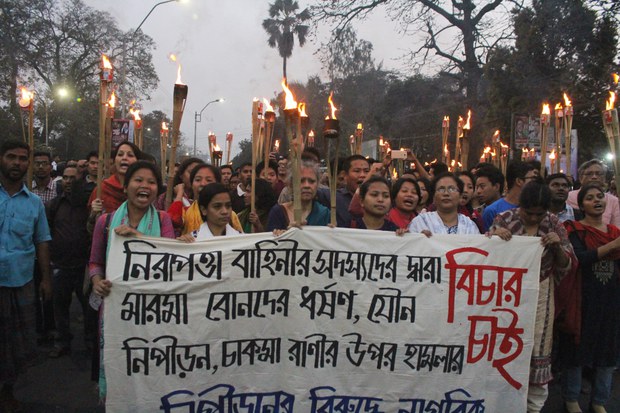Bangladesh: Alleged Rape of Tribal Woman under Investigation
2018.02.20
Washington
 Demonstrators chant slogans and carry signs during a rally in Chittagong to protest the alleged rape of a woman in Bangladesh’s remote hill district of Rangamati, Feb. 19, 2018.
Demonstrators chant slogans and carry signs during a rally in Chittagong to protest the alleged rape of a woman in Bangladesh’s remote hill district of Rangamati, Feb. 19, 2018.
Bangladeshi authorities are investigating claims that a tribal woman was raped by soldiers in a heavily militarized region of the country, officials said Tuesday.
Two security force members entered the 18-year-old’s residence in Rangamati district of southeastern Bangladesh on Jan. 22 and sexually assaulted her after tying up her parents, according to lawyer and human rights activist Sushmita Chakma.
The suspects also unsuccessfully tried to rape the woman’s 13-year-old sister, Chakma said, without elaborating.
“Before leaving the house, the rapists gave them 100 taka (about U.S. $1) and warned that they would face consequences if they make the incident public,” Chakma said.
Home Minister Asaduzzaman Khan Kamal told BenarNews on Tuesday that officials became aware of the rape allegations through the news media, and were investigating the incident.
He added that a medical examination on the woman did not corroborate her claim.
“The medical examination has not got any proof of rape. So, in line with the court order, the two girls have been handed over to their parents,” Khan said.
According to Chakma, the woman and her sister were kept under guard at a local hospital for almost three weeks, then confined at the home of a local politician.
Members of the National Human Rights Commission on Sunday formed a three-member panel to investigate the allegations.
“Upon receiving the inquiry committee’s findings, we will recommend the government to punish the culprits,” commission chairman Kazi Reazul Hoque told BenarNews.
Plagued by conflict
The rape claim threatens to ignite tensions between security forces and tribal people as the village where the alleged abuse took place was in one of the three districts of the Chittagong Hill Tracts.
About 1.6 million people live in the districts in the southeastern region of Bangladesh, bordering India and Myanmar. Half of them are ethnic Bengalis, while members of 11 tribes make up the rest of the population, according to the last government census in 2011.
In 1972, tribal leaders demanded autonomy for the region. But Bangladesh’s founding president Sheikh Mujibur Rahman rejected the demand. Violent clashes erupted the following year between secessionist rebels, the security forces and Bengali settlers.
In 1979, then-military ruler Gen. Ziaur Rahman authorized security operations in the hill districts. He also moved thousands of Bengalis into the area, and the government began leasing land to them. The region has been plagued by armed conflict since then.
Members of the Chittagong Hill Tracts Commission, which oversees the region, demanded an independent probe of the events and appropriate punishment for perpetrators if found guilty.
“While the state has repeatedly failed to provide security to indigenous women living in the Chittagong Hill Tracts, thus creating a culture of impunity, in the case of these girls it was reportedly the members of state security forces who themselves carried out these crimes,” the commission said in a statement.
Lt. Col. Mohammad Rashidul Hasan, head of the Inter Services Public Relation Directorate, said the rape allegation against the army was not true, according to New Age, a Bangladeshi news portal.
He said an army team in operation in the area at the time heard a girl screaming after a member of Ansar, a paramilitary force, entered her house. The man was handed over to his unit for interrogation, Hasan said.







